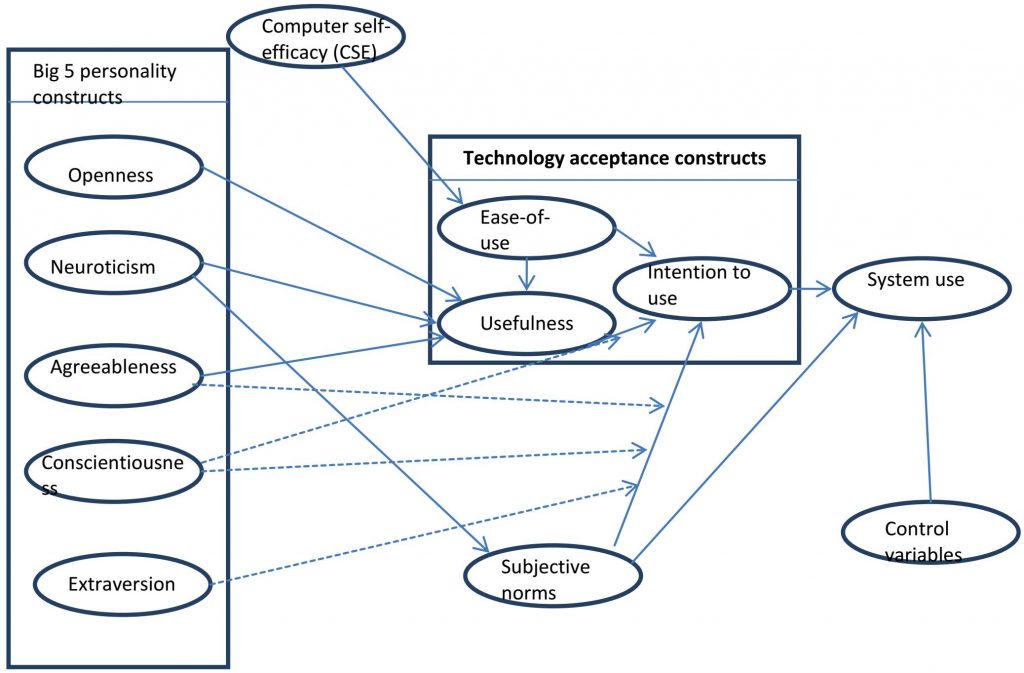
Personality & technical knowledge management systems research: Purpose & conceptual framework [Personality & TKMS series]
This is part 14 of a series of articles featuring edited portions of Dr. Maureen Sullivan’s PhD dissertation.
Many studies have been completed studying various themes such as organizational knowledge management, knowledge management systems, knowledge reuse, user satisfaction with information technology systems, and user satisfaction measurement. Although there are a wealth of theories on knowledge management, and an even greater wealth of studies on personality variables, few empirical studies have been performed that look at the interrelationship between these two areas. This leaves a major gap in the knowledge management system (KMS) body of literature.
The personality and technical knowledge management systems research will prove to play an important role in the academic arena and highlight how the varying personality traits of technical knowledge management system (TKMS) users can play a vital role in the acceptance of a TKMS. Additionally, practitioners can use the results of this study to design and implement new TKMSs that focus on the personality traits of the potential users, thereby increasing the chances of technology acceptance. On a different note, practitioners can plan educational training courses and reward programs that may focus on personality types that are resistant to new technology.
In the past, the five-factor model (FFM) of personality has been widely used and applied to research in the field of management and psychology, but rarely has it been discussed in the information system (IS) field. Devaraj, Easley, and Crant1 noted, “personality has been largely ignored in the [management information systems] literature over the past two decades. However, the field of personality psychology has significantly advanced since that time, and the FFM has sparked renewed theory and empirical investigation in other disciplines”. The personality and technical knowledge management systems research integrates the constructs of the FFM into the technology acceptance of TKMSs by examining how personality constructs influence perceived usefulness and ease of use and potential acceptance of TKMSs.
Barrick and Mount2 asserted that researchers found that context matters in IS research as the interests on moderated relationship increases. In fact, past research shows that the hidden relationship between personality traits and new technology acceptance was explicitly excluded from the technology acceptance model (TAM). Essentially, conclusions about the effect of personality traits on intention to accept a new technology are ongoing. The personality and technical knowledge management systems research focuses mainly on the usage of TKMSs, exploring the role that personality traits play on the unified theory of acceptance and use of technology (UTAUT) model as it relates to technology acceptance, either indirect or intervening.
Conceptual framework
The five key factors of FFM have been noted as influencing technology acceptance3. Figure 1 below incorporates this notion and system use and related control variable measurements. The personality and technical knowledge management systems research uses the IPIP NEO PI-R instrument to measure the Big Five personality factors of the five-factor model.

Next edition: Personality & technical knowledge management systems research: Theoretical framework.
References:
- Devaraj, S., Easley, R. F., & Crant, M. J. (2008). How does personality matter? relating the five-factor model to technology acceptance and use. Information Systems Research, 19(1), 93-105. doi:10.1287/isre.1070.0153 ↩
- Barrick, M. R., & Mount, M. K. (1991). The big five personality dimensions and job performance: A meta-analysis. Personnel Psychology, 44(1), 1-26. doi:10.1111/j.1744-6570.1991.tb00688.x ↩
- Devaraj, S., Easley, R. F., & Crant, M. J. (2008). How does personality matter? relating the five-factor model to technology acceptance and use. Information Systems Research, 19(1), 93-105. doi:10.1287/isre.1070.0153 ↩





very good stuff, I wish you could also show the process of determining personality of respondents
Charles this information is now available at http://realkm.com/2016/11/03/personality-tkms-measurement/